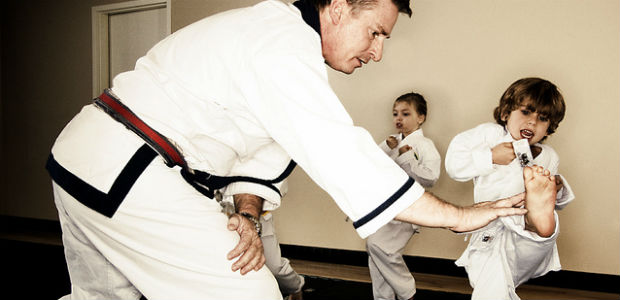Classroom management is one of the most critical components of teaching and an area that both new and experienced teachers are continually faced with. A teacher without control of a classroom is like a computer without a mouse–all of the learning potential is in place, but not much will be accomplished. Of course, every teacher must find what works for their personality. For Sara Bergerson, a great education (B.A. in Anthropology from Colorado College and an M.A. in Linguistics from the University of Florida) and a unique background in Taekwondo create the foundation of classroom management for one of Bridge Languages’ favorite teachers.
Working in the Academic English Program at Bridge, what are the biggest challenges you face with regard to classroom management?
I think one of the biggest challenges is treating adults like adults, but still sometimes having to discipline them. For me, I did Taekwondo when I was growing up. I started when I was 10, and by the time I was 14 I was teaching a lot of classes on my own. I learned a lot about how to be a leader, how to manage a class of kids or adults, and how to speak to them in a way that’s respecting them but also disciplining if needed.
Being in a classroom is much different than teaching a Taekwondo class in terms of discipline, but being a leader is the same, and just setting the tone of the class is really important.
What did you learn from Taekwondo that carried over into the classroom?
Lesson planning—having a plan for what you are going to do is important, and also to show the students the purpose of any exercise.
Also, how to speak—in Taekwondo there is a little bit more yelling, and more force with your commands, but in the classroom, it can be the same way. When I say something, I make sure I follow through with it. In Taekwondo the discipline could be something like doing pushups, but in the classroom, the disciplinary action has to be something that they know will be a consequence.
You have an excellent rapport with your students. How do you establish rapport?
With adult students, I have had similar life experiences, so it’s easier to relate, but also more challenging because they want to befriend you. It’s hard to find a balance as their friendly teacher and disciplinarian. It’s important to be understanding, but fair–I know that they will soon go to university and will have professors that won’t be overly sympathetic if they don’t do their assignments.
Any final thoughts on classroom management?
It doesn’t all have to be strict. It can be fun, too. You can joke, you can have games, as long as it’s a learning tool. You think of ruling with an iron fist, but that’s not always me. You don’t have to do it that way in order for the students to respect you. As long as you establish the tone in the beginning, they will respect you, and once they respect you, they will learn, they will be more open to what you have to say.
Sara Bergerson’s Top Four Tips to Successful Classroom Management
- Be clear with instructions and expectations – Write them down, and repeat yourself. Depending on the level of your students, what you are communicating may or may not register right away.
- Follow through with what you say you will do – If you say you’ll give a quiz, but don’t do it, they start to doubt you.
- Have a plan – But understand that plan may go out the window. Be prepared to improvise (this will come with experience. As you learn, you will have more things to pull out of your tool belt).
- Monitor yourself for pace—Are you going too slow or fast? Is everyone on task? Keep an eye on the group and make sure everyone is engaged.
Classroom management is always a challenging task for both new and veteran teachers if you’re looking for more tips on how to manage your classroom, check out this post on building rapport with your students.
This post was written by Matthew Clark.












